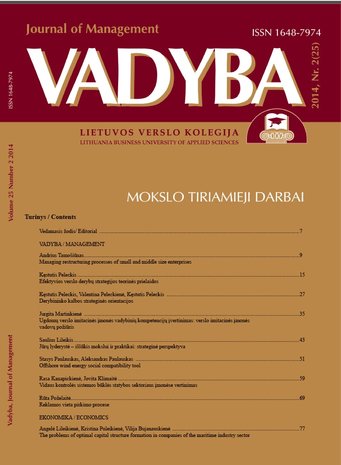JŪRŲ LYDERYSTĖ – IŠŠŪKIS MOKSLUI IR PRAKTIKAI: VALDYMO PSICHOLOGIJOS STRATEGINĖ PERSPEKTYVA
THE MARITIME LEADERSHIP AS A CHALLENGE TO SCIENCE AND PRACTICE: MANAGEMENT PSYCHOLOGY STRATEGIC PROSPECT
Author(s): Saulius LileikisSubject(s): Economy
Published by: Lietuvos verslo kolegija
Keywords: Maritime leadership; maritime policy; management psychology; strategic prospect; seafarer’s personality.
Summary/Abstract: The maritime leadership partially became a new challenge of the shipping practice and maritime science. The philosophy of the maritime leadership is understood from the political point of view. However, opportunities of its implementation are and must be scientifically investigated under various relevant psychosocial and technological aspects. It is appropriate to investigate the strategic line of the maritime leadership in regard to the mention argumentation and to big variety of scientific ideas, conceptions and positions. The object of the research consists of the maritime leadership phenomenon. The aim of the research is the discussion of a strategic line of the maritime leadership. Tasks are as follows: 1. Revelation of the maritime leadership educational prospect. 2. Characterization of the leadership and anti-leadership principal moments. 3. Definition of the self-leadership, life- and supporting leadership. 4. Revelation of psychological defense mechanisms. Research methodology: International Standards of Training, Certification and Watchkeeping for Seafarers (STCW Convention) with Manila amendments require the leadership training and applying in the ship-crew (STCW Manila Seafarer Training Amendments [...], 2011). Shipping safety relates to applying the maritime leadership. This kind of leadership is based on the self-leadership development and expression, and is characterized by the positive worldview, creativity, wide intellectual horizon, perception of psychological defense mechanisms and its partial management, and collaborative culture in the ship-crew. The paradigm of universal upbringing orients to develop all powers of the personality at horizontal and vertical levels of human existence according to biologic, psychological and spiritual needs and its satisfaction (Jovaisa, 2001). The integral development of the personality’s self-leadership competence is universally based on the paradigm from the psychological point of view. The type of the research is theoretically descriptive and qualitative. Methods such as retrospective analysis of the scientific literature, meta-analysis, comparison, heuristic method and synthesis were used in the research. The maritime leadership, based on the moral and special authority, has been traditionally and indirectly developed in Eastern Europe in the educational prospect of the maritime leadership. It has been oriented to the combining of personal, social and technologic competences by noting an academic symbiosis of the maritime leaders and scientists in seafarers’ preparation. An active prosocial tendency, from the point of view of the results, characterizes the principal moments of the leadership. Anti-leadership is characterized by ignoring of rules of the organizational coexistence. Leadership, that promotes the working-awareness of the crew members, is relevant to working at the sea in extreme conditions. The self-leadership is an orientation to oneself, to the consciousness o
Journal: VADYBA
- Issue Year: 25/2014
- Issue No: 2
- Page Range: 43-49
- Page Count: 7
- Language: Lithuanian

